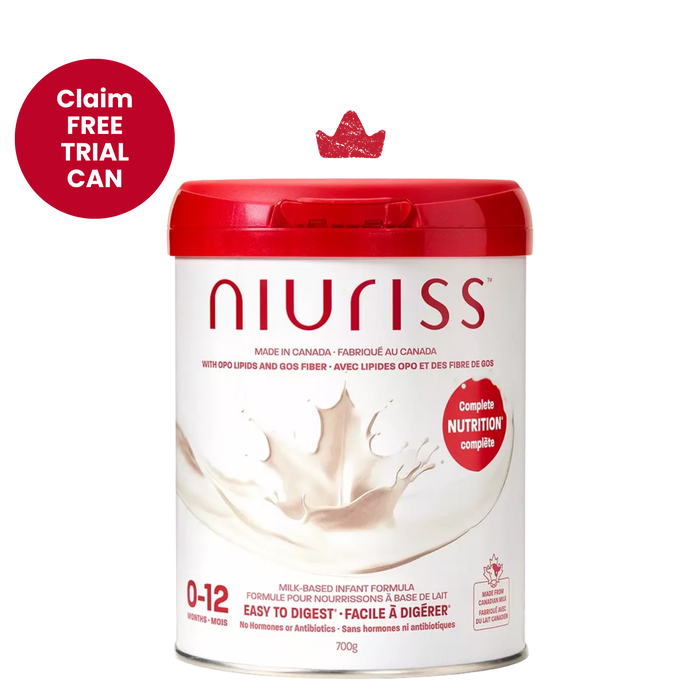

Prebiotics & Probiotics in infant nutrition: What parents should know!
Written by Kathryn Holt. Registered Dietitian.
Lakeside RD, Custom Nutrition and Counseling
Gut health plays a vital role in our overall well-being, and it all starts with nurturing the good bacteria that live within it. Although focusing on proper nutrition is essential to gut health, there is a role for prebiotics and probiotics to help support a healthy digestive system, even in babies. These nutrient components can promote the growth of healthy gut bacteria to improve digestion, help regulate or enhance immune function and may even have a role in mental health.

Prebiotics vs. Probiotics
Prebiotics and probiotics may sound similar, but they serve distinct roles in the human gut. Probiotics introduce beneficial bacteria into the digestive system, while prebiotics nourish those good bacteria:
-
Probiotics are live bacteria - good bacteria- and yeasts that help colonize the gut with beneficial microbes. These can be found in fermented foods like:
- Yogurt
- Kefir
-
Sauerkraut.
- Prebiotics are a type of dietary fiber or carbohydrate that acts as a substrate for bacteria that are naturally present in the digestive system. In other words, they nourish the bacteria already present to help maintain normal gut function. They are found naturally in foods like:
-
- Whole grains
- Bananas
- Onions
- Garlic
-
Sweet potato and other fiber-rich vegetable

How do they support health?
There are a variety of benefits to both prebiotics and probiotics. Principally, they help support normal digestive health by promoting a balanced microbiome (bacterial colonies) within your stomach and intestines. They’re also commonly used as supplements to support gut health in individuals with gastrointestinal conditions such as irritable bowel syndrome (IBS), certain forms of colitis, and those experiencing diarrhea or constipation.
Healthy gut bacteria are essential to ensure proper nutrient absorption, metabolism, and glucose control. A healthy gut microbiome is also necessary for immune system function; thus probiotics and probiotics can help support strong immunity.
The Role of Prebiotics & Probiotics in Infant Nutrition
The development of a proper gut microbiome is essential for growing infants and directly contributes to long term gut health. Luckily, infants can get exposure to prebiotics and probiotics through their feeding routines.
-
Breast milk naturally contains prebiotics that feed healthy bacteria in the baby’s gut.
-
Infant formula is often fortified with prebiotics and probiotics to support this development.
While prebiotics nourish the good bacteria in the gut, probiotics introduce live beneficial bacteria that support digestion and immunity. Some strains may also help with conditions like colic, eczema, and cow's milk protein allergies. In our next blog, we’ll explore the many benefits probiotics can offer for your baby’s health!

Risk of Supplementation
Although supplementation with prebiotics and probiotics is generally safe, some individuals may experience bloating, gas or diarrhea. Certain prebiotic fibers may not be tolerable in people with gut sensitivities. Individual responses may vary, and it is always recommended to consult your healthcare team before starting on any supplements.
What’s Next?
In our next blog, we’ll dive deeper into prebiotics— how they support digestion and how Niuriss includes them in our formula. After that, we’ll explore probiotics and their role in gut health to help you make informed choices for your family.
References:
Abrahamsson TR, Jakobsson HE, et al. Low diversity of the gut microbiota in infants with atopic eczema.
J Allergy Clin Immunol. 2012;129(2):434
Fiocchi A, Pawankar R, et al. World Allergy Organization-McMaster University Guidelines for Allergic Disease Prevention (GLAD-P): Probiotics. World Allergy Organ J. 2015;8(1):4
Food and Agriculture Organization of the United Nations. Health and nutritional properties of probiotics in food including powder milk with live lactic acid bacteria. http://www.who.int/foodsafety/publications/fs_management/en/probiotics.pdf (Accessed March 2025)
Gibson GR, Hutkins R, et al. Expert consensus document: The International Scientific Association for Probiotics and Prebiotics (ISAPP) consensus statement on the definition and scope of prebiotics. Nat Rev Gastroenterol Hepatol. 2017;14(8):491
Osborn DA, Sinn JK. Prebiotics in infants for prevention of allergy. Cochrane Database Syst Rev. 2013
Prescott SL, Björkstén B. Probiotics for the prevention or treatment of allergic diseases.
J Allergy Clin Immunol. 2007;120(2):255

Kathryn Holt
Registered Dietitian
Lakeside RD, Custom Nutrition and Counseling
https://lakesidecustomnutrition.com/



